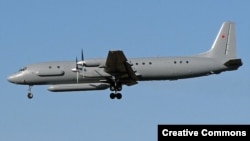NATO says Russia has increased provocative military actions in and around the Baltics in recent months. They include the reported incursion of a Russian spy plane into Estonian airspace earlier this week.
“I would suggest that the level of this provocative flying is higher than at the height of the Cold War,” said a NATO spokesman who added that they’ve seen “a threefold increase in the number of NATO intercepts this year than last year in the Baltic region.”
The spokesman added that both Sweden and Finland have seen increases in provocative Russian activity.
Estonia said a Russian Ilyushin-20 surveillance aircraft violated its airspace on Tuesday for about one minute during which it penetrated about 600 meters. NATO said it scrambled jets to escort the Russian plane out.
Russia denied Estonia’s claim.
Still, NATO, which policies the area from the skies, said the Russian activities are provocative because the planes don’t need to fly the way they do to get to where they’re going. The planes don’t file a flight plan and they don’t “squawk,” meaning they don’t send out information that other airlines and air traffic controllers need to track planes, NATO says.
“One of the reasons we intercept is that we need to visually see them so we can tell commercial air traffic control” who then passes the information to commercial airliners in the area, the NATO spokesman said.
Russian actions are drawing attention.
Sweden on Friday called off a search for what it suspected was a Russian submarine in its territorial waters. Last month, Russia abducted an Estonian intelligence officer in a cross-border raid. Russia claimed the officer was apprehended spying in Russian territory.
Richard Kauzlarich, a senior fellow at the Brookings Institute, called Russia’s moves “a new pattern of aggression.”
“I don’t think we’ve reached the peak of this yet,” he said. “I think there’s more to come. They’re going to keep at it.”
Russia’s moves are meant to send a message to the Baltics, Kauzlarich said.
“I think they want to make clear to the Baltic states that Putin has them every bit as much in his policy attention span as other [areas of the world],” he said. “This idea of protecting Russian minorities that has been the justification for what he’s done in Ukraine is coming up in the Baltics.”
But while there are substantial populations of ethnic Russians in the Baltics, Brian E. Carlson, a former U.S. ambassador to Latvia, said the Russian minorities are not a monolith.
“In the Baltic countries, especially Estonia and Latvia, you have an older population [of ethnic Russians] that look back on the ‘good ol’’ days of the Soviet Union when everyone had work,” Carlson said.
For younger ethnic Russians in the Baltics, it’s quite different, he said.
“I don’t think there’s a serious longing to join Russia or be more like today’s Russia among the younger generation,” he said. “They’re committed to a Western lifestyle. Time is going to take care of the older generation.”
Carlson said he didn’t think Russia would do in the Baltics what it did in Crimea with its annexation move.
“My guess is that Putin will not push as hard as he could in the north,” he said citing German, Swedish, Norwegian and Finnish interests in the Baltics. “They’d be more likely to invoke Article 5.”
NATO’s Article 5 requires member states to come to the aid of another member state facing an armed attack.
But Paul Raudseps, a commentator for the Latvian magazine Ir thinks Putin is trying to “reconstitute as closely as possible, the Soviet sphere of influence” and doesn’t believe NATO will defend the Baltics.
“He’s looking for the next weak spots, probing here, probing there,” he said. “He’s not going to get it all at once. He’s going to be president for a while. It’s a long game.”




